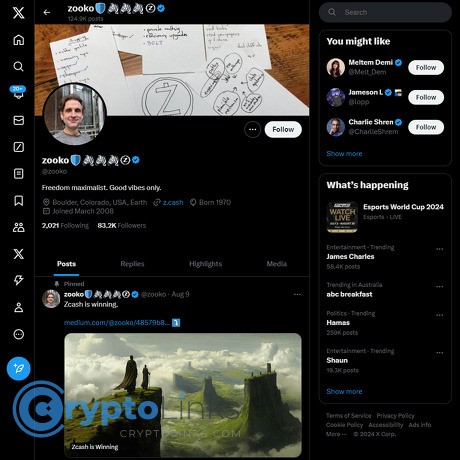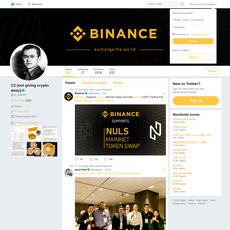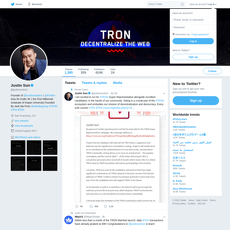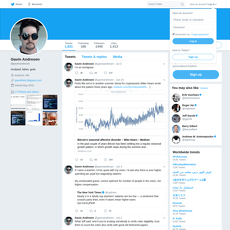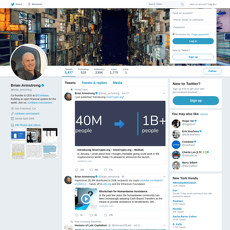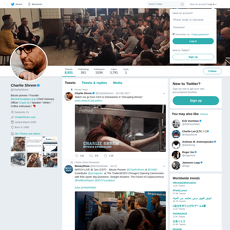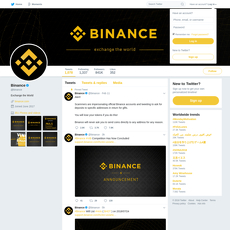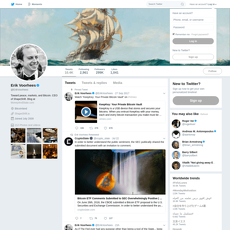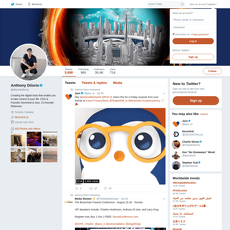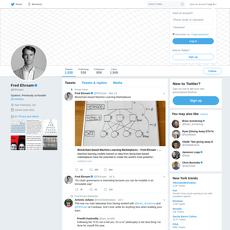zooko Review
zooko
x.com
Zooko (@zooko) Review Guide: Everything You Need to Know + FAQ
Wondering if following @zooko on X is worth your time—or just another distraction in an already noisy feed?
If you care about privacy tech, Zcash, and honest analysis from a long-time builder, you’re in the right place. I’m going to break down his feed like I would any crypto site: what you’ll get, what you won’t, and how to turn it into real research value without scrolling for hours.
Short version: you’ll get signal about Zcash, privacy culture, and governance—without price hype. But you need a simple setup to catch the good threads and skip the rest.
The common pain: signal vs. noise on crypto X
Crypto X can be a mess. Experts and hype merchants look the same at a glance. Threads splinter, replies derail, and impersonators siphon attention. You want trustworthy info on privacy and Zcash—but not another firehose.
- Noise overwhelms signal: Research from MIT found false news spreads faster and farther on social platforms than true news—about 70% more likely to be retweeted (Science, 2018). That’s the environment you’re scrolling in.
- Context gets lost: Policy and governance debates are nuanced. Without background, it’s easy to misread a hot take or miss the real update buried in a reply chain.
- Impersonators are real: Lookalike handles, cloned bios, and opportunistic DMs make it risky to trust screenshots or “opportunities.”
- Time is tight: You can’t babysit a timeline all day to catch one useful thread about privacy tech or Zcash governance.
This guide is built to cut through that mess. I’ll focus on what matters, show you how to spot real value fast, and help you avoid common traps.
The promise: a practical, honest review
Here’s what I’m going to do for you—no fluff, no fanboying:
- Map out what @zooko actually posts and how it fits a serious research workflow.
- Explain where his feed shines (signal you can use) and where you’ll want to cross-check or skip.
- Give you a simple playbook to track the best threads without getting stuck in the timeline.
- Call out real risks (fakes, misreads, DM scams) and how to avoid them.
I’m not here to sell you on a personality. I’m here to help you decide whether this account belongs in your workflow—and how to use it if it does.
What you’ll walk away with
- Clarity: A realistic preview of content style, cadence, and how useful it actually is.
- Workflow tips: How to track threads, bookmark the dense ones, and filter noise.
- Safety checks: Quick ways to verify the real account and avoid clones.
- Practical value: How to spot protocol updates, governance notes, and research links that matter.
Think of it like tuning a radio: less static, more signal.
Who this is for
- Builders and researchers who want technically grounded updates without price chatter.
- Privacy advocates who track Zcash, cryptography culture, and policy conversations.
- Curious crypto folks who’d rather follow one thoughtful account well than a hundred noisy ones.
If that’s you, you’ll get a lot from this guide. And if you’re asking, “Okay, but who exactly is Zooko and why do his posts matter in privacy and crypto policy?”—that’s exactly what I’m tackling next. Ready to see why his account shapes real conversations without the hype?
Who is Zooko and why his X account matters
When I want clarity on privacy tech without the hype, I check @zooko. He’s one of the rare builders who has shipped serious cryptography, argued for sane policy, and stayed present in public conversations. That mix—hands-on engineering, long memory, and a bias for transparency—makes his feed shape how people talk about Zcash, privacy coins, and the rules being written around them.
“Privacy is normal.”
He repeats that line often. It’s not a slogan—it’s a north star. And it tells you exactly where his takes come from.
A short bio (what you should know, not a history lesson)
Zooko Wilcox is best known for starting the team behind Zcash and pushing zero-knowledge tech from academic promise to consumer-grade reality. Before that, he worked on peer-to-peer systems and secure storage that still get referenced today.
- Zcash origin story: Founding mind behind Zcash, the privacy-focused cryptocurrency built on zero-knowledge proofs (zk-SNARKs). He helped steer the vision and roadmap through early breakthroughs like shielded transactions and the Halo/Orchard era.
- Open-source security roots: Co-founded Least Authority and created Tahoe-LAFS, a decentralized, fault-tolerant storage system used in privacy/security circles.
- Naming and networks: Popularized “Zooko’s Triangle”, a well-known idea in computer science about the trade-offs in naming systems (secure, decentralized, human-meaningful—pick two… usually).
- Ship first, argue second: He’s part of that small group that built things before crypto was cool—peer-to-peer projects, distributed systems, and real cryptography in production.
If you care about real-world privacy engineering, that history matters. It means when he references a paper or a trade-off, it’s usually connected to code or a roadmap—not just thought leadership.
Areas he posts about
Expect a steady thread through Zcash, privacy, and the norms that keep open-source healthy. The topics are consistent, but the angles evolve as the tech and policy do.
- Zcash progress and governance: Notes on network upgrades (think NU5, Orchard), funding debates, and strategic shifts like exploring proof-of-stake. You’ll see pointers to GitHub ZIPs (Zcash Improvement Proposals) and community calls that actually move decisions.
- Privacy tech and zero-knowledge proofs: Links to research that powers Zcash and the wider zk movement—like recursive proofs that remove trusted setups. If you’re new, start with the Halo paper: “Halo: Recursive Proof Composition without a Trusted Setup” (Bowe, 2019). He often frames why such research matters for real users, not just academics.
- Open-source culture and funding: Strong views on maintainership, sustainability, and security audits (Least Authority’s audits show up as solid examples). He pushes for practices that make code safer and communities healthier.
- Regulation and policy: Takes on FATF’s Travel Rule, sanctions policy, and how privacy tech can be compatible with the law without compromising basic rights. You’ll get context, not panic.
- Personal context: Reflections from years in the trenches—what went right, what didn’t, and what he’d try next. It humanizes the work and gives you the “why behind the what.”
Concrete samples you’ll see in his feed:
- Threads explaining the trade-offs in moving Zcash toward proof-of-stake, tying it to security, sustainability, and user experience.
- Links to ECC and Zcash Foundation research with short, plain-English framing—e.g., why recursive SNARKs matter for mobile wallets and fee efficiency.
- Governance notes that preview where community consensus is forming, plus calls to review specific ZIPs or proposals.
- Policy alerts that separate real regulatory changes from Twitter rumors, with pointers to primary sources.
There’s a useful pattern here: he posts the original source (paper, ZIP, audit), adds a short interpretation, and invites scrutiny. That rhythm reduces noise and helps you build your own view.
Influence without hype
Does he move markets? No. Does he move conversations that ultimately shape protocol priorities? Often, yes.
- Who amplifies him: cryptographers, privacy engineers, researchers at open-source orgs, policy advocates, and Zcash community leaders. The replies are frequently more valuable than the retweets.
- Where he’s consistently early: recognizing which zk research is ready for users, calling for better developer experience around privacy, and pushing security-first norms.
- Where he’s openly exploring: long-horizon governance, incentive design, and major shifts like proof-of-stake—areas where he tends to argue in public and invite counterpoints.
- Why this matters: Studies in open-source decision-making keep showing that transparent debate and early exposure to trade-offs improve outcomes. When a founder-type shares unfinished thinking and links to the work, it accelerates review and reduces groupthink.
Put simply: he’s not trying to “win Twitter.” He’s trying to make privacy tech survive contact with reality. When someone who’s shipped serious crypto says “this is hard, but worth it,” I pay attention.
So if that’s the who and the why, what does following him actually feel like in your feed—how technical is it, how often does he post, and which types of threads are worth your time? I’ll show you exactly what to expect next.
What you actually get by following @zooko
If your feed is full of noise, this is one of the rare accounts that actually teaches. You’ll see the thinking behind privacy tech, the tradeoffs, and the messy parts of building in public—without the performative chest beating. It’s not a firehose. It’s a workshop.
Content style and cadence
Think fewer posts, more value. He’ll publish thoughtful threads when something matters (a protocol change, a governance moment, a new research link), and go quieter when there’s nothing new to add. Replies are where you see his process—probing questions, corrections, and honest “I might be wrong, show me.”
- Threads worth bookmarking: structured like mini-briefings—context, link to the source, what it means for users/builders, and open questions.
- Occasional hot takes: short, pointed opinions on privacy policy or crypto culture—then follow-ups that add nuance.
- Reply-mode signal: he jumps into technical or governance discussions, which often surfaces the best explanations before they hit official posts.
“Privacy is the power to selectively reveal yourself to the world.”
That’s the vibe: practical, human, and pointed toward consent and user agency—not just cryptography for its own sake.
Depth meter: beginner-friendly or expert-only?
Both—but you need to meet the content halfway. If you’re new to Zcash or zero-knowledge proofs, the language can feel dense. The good news: most threads link out to primary sources so you can catch up fast. I recommend skimming a few essentials so the posts click on first read:
- Zcash Technology (official overview) — the shielded pools (Sapling, Orchard), how transactions work, and where ZK proofs fit.
- ZIPs (Zcash Improvement Proposals) — especially the governance and dev fund ZIPs to understand recurring debates.
- ECC Blog and Zcash Foundation Blog — readable updates that he often references.
Once you’ve got those, most of his posts will feel “expert-accessible” rather than “expert-only.” When he goes deep (e.g., Halo 2, recursive proofs, wallet UX security), he tends to frame why it matters so non-specialists can still get the core point.
Signal you can use
Here’s the type of content that consistently turns into real insight for builders, researchers, and serious watchers:
- Protocol updates that matter: pointers to network upgrades, roadmap shifts, or critical bug learnings, usually with the right link so you can verify. Expect references to things like the Orchard shielded pool, Halo 2, and wallet safety tradeoffs—told from the angle of “how this affects users and devs.”
- Governance notes and context: short explainers when the community argues about funding or direction (think dev fund ZIPs or community grants). The value is the framing—what’s at stake and what good-faith compromise might look like—so you’re not guessing from rumor.
- Research breadcrumbs: links to papers, blog posts, or GitHub discussions on zero-knowledge proofs, privacy-preserving payments, and security culture. If you’re time-poor, this curates the right starting points.
- Clarity in heated debates: when crypto policy or privacy tools hit headlines, you’ll see attempts to separate ethics, law, and engineering realities. That’s crucial, because misinformation spreads fast on social media; one widely cited study in Science found false news travels “farther, faster, deeper” than truth on Twitter. Having the primary links and a sober read saves you from the outrage loop. (Source)
- Builder perspective: notes on what’s hard in production: wallet UX, dev incentives, privacy-by-default vs. regulator friction. It’s not market-moving, but it’s roadmap-shaping.
What a “useful thread” typically looks like here: a one-liner summary of a change, a link to the ZIP or official post, a short paragraph on user impact (“wallets will need to …”), and a nudge for critique. That last piece is underrated—you get to watch ideas get stress-tested in real time.
What you won’t get
- No price calls. If you want “$ZEC to X by Friday,” look elsewhere.
- No sponsored pumps. You won’t see stealth ads or shill campaigns dressed up as “research.”
- No engagement bait. Expect fewer posts and fewer memes. It’s built for people doing the work, not chasing the algorithm.
If your goals are short-term trading or daily market commentary, you’ll probably feel underfed. If your goals are understanding privacy tech, Zcash governance, and the craft of shipping hard things, you’ll feel seen.
Want to turn this into a compact weekly research stream—without living on X all day? Next up, I’ll show you the simple setup I use to pull his best threads to the top of my feed, alert on the right topics, and skip the rest. Which one do you want first: my exact X List, or the search operators that surface gold in 10 seconds?
How to follow smart: setup, filters, and quick tactics
I want your feed to work like a research terminal, not a slot machine. Here’s how I turn @zooko into usable signal in minutes per week, without getting sucked into endless scrolling.
“A wealth of information creates a poverty of attention.” — Herbert A. Simon
Set up an X List
Lists are the simplest way to keep Zcash and privacy updates in one clean lane.
- Create a private List named “Zcash + Privacy.” Private = no social pressure, no clutter.
- Add these pillars:
- @zooko
- Official Zcash orgs (Electric Coin Co, Zcash Foundation, the main Zcash account)
- Two or three independent cryptography/privacy researchers you trust
- One or two policy/critique voices to avoid echo chambers
- Pin the List to your X sidebar and mobile nav so it’s one tap away.
- Keep it tight: 12–20 accounts max. The smaller the garden, the fewer weeds.
Why this works: studies on scanning behavior show people read faster and retain more when content is grouped by task and reduced in scope. Fewer sources, higher comprehension. (See Nielsen Norman Group’s research on focused navigation.)
Use alerts without getting spammed
Notifications are a tax on your attention. Use them surgically.
- Tap the bell on @zooko and set to Highlights for baseline signal. Switch to All Tweets temporarily when a major thread starts, then switch back.
- Bookmark first, read later: when a thread looks meaty (governance, protocol notes), I bookmark it and skim in one sitting.
- Snooze when noisy: if your phone starts buzzing, use X’s push-notification snooze (1–24 hours) and batch-check your List instead.
Why this works: interruption research from UC Irvine (Gloria Mark, PhD) shows it can take ~20+ minutes to fully refocus after a digital interruption. Protect your deep work; batch the feed.
Find the good stuff fast with search
Skip the scroll. Use simple operators to surface the threads you actually need.
- Core operators:
- from:zooko only shows his posts
- -is:reply hides reply-only chatter (great for original threads)
- filter:links shows posts with links to papers, repos, updates
- min_faves:50 or min_retweets:10 bubbles up higher-signal posts
- since:YYYY-MM-DD until:YYYY-MM-DD brackets an event window
- Copy-paste recipes:
- from:zooko Zcash -is:reply
- from:zooko governance OR "network upgrade" -is:reply
- from:zooko Halo OR "zero-knowledge" filter:links min_faves:50
- from:zooko NU5 OR "upgrade" since:2022-01-01 until:2022-12-31
- from:zooko regulation OR policy filter:links
- Hack: combine your List with search by adding keywords in the List timeline search bar—fast triage when a topic trends.
This turns his history into a lightweight research archive. You’ll find the “anchor” posts fast—then bookmark or export links to your notes app.
Safety first: verify the account and avoid fakes
Clones are common in crypto. Trust, then verify.
- Open the handle directly: https://x.com/zooko
- Check profile history: long post history, consistent voice, and older joins are good signs.
- Cross-link check: confirm links from official orgs (ECC, Zcash Foundation) and reputable researchers point to that handle.
- Link hygiene: the bio/site should resolve to known domains; no shortened links promising “grants,” “airdrops,” or “claim here.”
- DM rule: never engage with DMs offering “opportunities,” and never share keys, seed phrases, or signing approvals. Zero exceptions.
Reminder: verification badges aren’t proof. Network trust (who vouches for whom) is harder to fake than a blue check.
Balance your feed
Staying objective takes a tiny bit of setup—and it pays off.
- Mute noise words: “giveaway,” “airdrops,” “bonus,” “price target,” “pump,” “free.” Your List will breathe easier.
- Add counter-views: one or two voices who challenge privacy coin narratives or governance choices. Friction sharpens thinking.
- Keep the List focused: if an account posts mostly memes or markets, remove it. You’re curating a research stream, not a party.
There’s strong evidence that curated diversity reduces misinformation risk and confirmation bias (see MIT’s 2018 study in Science on how false news spreads faster than truth). A balanced List makes you faster and safer.
One more practical rhythm: I batch-check my List twice a week, run the search recipes above for anything I missed, and process bookmarks in one sitting. It feels calm. It works.
Now, tooling is great—but is the signal coming from the right place? In other words, how credible is it, where might bias creep in, and who actually benefits from following? I’ve got a clear scorecard for that next—want the numbers?
Credibility, bias, and my reviewer rating
I care about one thing when I follow someone on crypto X: can I use this to make better decisions, faster? With @zooko, the answer mostly comes down to how you value primary sources, honest process, and the long view on privacy tech.
“Privacy isn’t about hiding; it’s about choosing what to share.”
Strengths
Builder-level signal, not influencer noise. He points you to specs, code, and research instead of vibes. When Zcash’s NU5 shipped, for example, his posts and replies linked to resources that actually matter, like the mainnet announcement and the cryptography behind Halo:
– NU5 context: electriccoin.co/blog/nu5-mainnet-launch/
– Halo research (original): eprint.iacr.org/2019/1021
Governance receipts. You’ll see him highlight proposals, trade-offs, and community arguments with direct links. That pulls you out of rumor loops and into the record:
– Zcash Improvement Proposals (ZIPs): zips.z.cash
– Community governance discussions: forum.zcashcommunity.com
Willingness to think in public. Threads often show the reasoning, not just the headline. That’s rare—and useful. Usability research backs this up: visible process and source transparency are strong trust signals on the web (Nielsen Norman Group). Social media studies also suggest that history, external references, and author consistency improve perceived credibility (Castillo et al., 2011).
Bridges beyond Zcash. You’ll catch pointers into the wider ZK and security worlds (think ethresear.ch, academic work, and open-source debates). That cross-pollination matters when you’re tracking where privacy tech is headed, not just where it is.
Potential bias and blind spots
Mission lock-in. He’s deeply connected to Zcash’s purpose and history. That’s a strength for context—and a reason to cross-check hot governance topics (funding, roadmaps, or a possible PoS path) with independent sources like the Zcash Foundation and third-party researchers.
Founder syndrome risk. Long-time leaders can unconsciously anchor to earlier assumptions (Wikipedia: founder syndrome). Watch for this when the community reevaluates priorities (e.g., L1 incentives vs. UX, or privacy defaults vs. compliance narratives).
Optimism bias around novel cryptography. He’s enthusiastic about breakthrough ZK systems. That’s good energy—just pair it with independent reviews and security audits (optimism bias) and always read the ZIPs/specs yourself.
Limited market utility. If you want price targets or trading signals, you won’t find them here. Expect tech and governance signal, not chart talk.
Who will love following @zooko
- Builders and researchers who want to read originals (ZIPs, papers, repos) and understand trade-offs straight from someone who’s shipped real cryptography.
- Privacy advocates and policy watchers who track how narratives form around regulation and civil liberties.
- Product leads shaping roadmaps that intersect with privacy, wallets, or cross-chain ZK tech.
Who may not
- Short-term traders seeking entries/exits, sentiment spikes, or price calls.
- Casual readers who want constant entertainment. The cadence is thought-first, not content-for-content’s-sake.
My rating framework
Signal-to-noise: 4.5/5
Clear links to primary sources, minimal fluff. You get direction, not drama.
Technical depth: 4.6/5
Strong on ZK, protocol design, and privacy UX challenges. When in doubt, he points to specs and research.
Transparency: 4.4/5
Willing to outline thinking and admit uncertainty. You’ll see process, not just results.
Responsiveness: 4.0/5
Engages in threads, especially on governance and misconceptions, but not 24/7.
Practical value for builders/researchers: 4.5/5
High—if you follow links and read. Best used alongside ZIPs, ECC/ZF posts, and third-party audits.
Overall: 4.5/5
A strong follow for privacy and protocol work, with a known pro‑Zcash lens that’s healthy to balance with independent voices.
Curious how to quickly confirm the account you’re following is the real one—and not a clever clone that hijacks Zcash keywords? I’ll show you the fastest checks next, plus a few safety habits that save headaches.
FAQ: the stuff people actually ask about @zooko and Zcash
Is @zooko’s account official and how do I verify it?
Yes—this is the handle: @zooko. Here’s the quick verification routine I use so I don’t get fooled by clones:
- Match the handle exactly: Spelling matters. Imposters love swapping letters like 0 for o.
- Check account history: Click through older posts and replies. You’ll see years of Zcash, privacy, and crypto policy threads—clones rarely have that depth.
- Cross-reference from official orgs: Look for mentions or links from Electric Coin Company, Zcash, and Zcash Foundation. Also check their websites: electriccoin.co, z.cash, zfnd.org.
- Sanity-test the content: Search operators help: from:zooko Zcash, from:zooko governance, from:zooko Halo, from:zooko Orchard, from:zooko FROST. Real account = consistent, technical, long-running discussion.
- Red flags: New account dates, “opportunities” in DMs, requests for funds/keys, Telegram redirects. The FTC has warned for years that impersonation scams thrive on social platforms—stay cautious.
Never share your seed phrase, private keys, or signing approvals with anyone claiming to be Zooko. He won’t ask—scammers will.
What is Zooko best known for?
Plain-English version: he helped start Zcash and led the early team (Electric Coin Company), he’s a long-time privacy/security builder, and he’s the guy behind the famous “Zooko’s Triangle” idea about naming systems (readable, secure, decentralized—pick two). Before Zcash, you’ll see him connected to open-source security projects like Tahoe-LAFS and early decentralized tech experiments.
Does he talk only about Zcash?
No. Zcash is a recurring theme, but you’ll also catch:
- Privacy tech: zero-knowledge proofs, wallet safety, the social realities of privacy online
- Cryptography culture: how researchers and engineers work in public
- Open-source norms: governance, incentives, sustainability
- Policy and regulation: audits, compliance, and why privacy rights matter
If you want examples fast, run: from:zooko "privacy", from:zooko "governance", from:zooko "policy".
Is he still with Electric Coin Company?
He co-founded Electric Coin Company (the team behind Zcash) and has held leadership roles. Roles change, so I always check two places for the latest:
- His X bio: https://x.com/zooko (bios get updated quickly)
- ECC’s official pages: electriccoin.co and @ElectricCoinCo for leadership announcements
Bonus check: search ECC’s blog for leadership updates using site:electriccoin.co/blog CEO or site:electriccoin.co/blog leadership.
Will I get price targets or trading calls?
No. Expect research and perspective, not trading signals. You’ll see protocol updates, governance threads, and links to technical discussions—not “buy/sell” posts. If you’re after price action, this isn’t the account for that.
How should I use his posts for research without bias?
I treat his account as a high-signal lens, then pair it with independent sources to stay grounded:
- Cross-check claims: compare any big statements with original specs and proposals: Zcash Improvement Proposals (ZIPs).
- Read the community’s take: scan debates on the Zcash community forum and the Zcash Foundation updates.
- Look for counterpoints: follow a couple of researchers with different views on privacy coin governance and funding. Your goal is triangulation, not echo chamber.
- Use smart filters:from:zooko -is:retweet "ZIP", from:zooko "governance" min_faves:20, from:zooko "wallet" OR "shielded" to get depth fast.
Can I contact him?
Public replies are safest and most effective—keep it short, specific, and respectful. If his DMs are open, treat them like a professional channel:
- Never send funds, seed phrases, or signing approvals.
- For proposals or research questions, link to a forum post on the Zcash community forum so it’s transparent and easy to reference.
- If it’s an ECC-specific matter, use ECC’s contact options or @ElectricCoinCo.
Simple rule: if someone claiming to be him asks for money or private info, it’s a scam. Report, block, move on.
One last thing—want my 60-second setup to get signal without the scroll? I’m sharing it next, including the exact list makeup and notification settings that keep me sane. Ready to set it up once and forget it?
Should you follow @zooko? My short answer
Yes—if you care about privacy tech, Zcash progress, and clear thinking from someone who’s been building in this space for years. Add @zooko to a focused list and use selective alerts so you catch the threads that actually move your understanding forward. If you’re looking for price targets or trading calls, this won’t serve you.
Follow for perspective and context, not pumps. That’s where the real edge lives.
A quick action plan
- Make a “Zcash + Privacy” X List. Add @zooko, @zfnd (Zcash Foundation), and @ElectricCoinCo. Keep it tight—fewer voices, higher signal.
- Turn on thread notifications (not every post). Research on attention shows interruptions crush focus; UCI’s Gloria Mark found task switches can cost minutes of recovery time. Be picky with alerts so you don’t pay that tax on every ping.
- Bookmark, then batch. Save deeper threads and process them once or twice a week. Spaced review beats skimming for retention—see distributed practice findings in cognitive psychology.
- Set two saved searches for quick pull-ups:
- from:zooko “governance”
- from:zooko “Zcash”
These surface substantive threads fast without scrolling. - Cross-check big claims. For protocol or roadmap topics, compare with official posts and community discussions:
- Zcash forums: forum.zcashcommunity.com
- ECC blog on upgrades (example: NU5/Orchard): NU5 mainnet
- Background on zero-knowledge progress (example: Halo): Halo 2 - Keep a tiny research log. One sentence per thread: “What changed? Why it matters.” You’ll build a personal context map instead of re-learning the same facts.
- Stay scam-proof. Only trust https://x.com/zooko. Never engage with DMs promising opportunities. If it asks for funds or keys, it’s a scam.
Why this setup works: selective alerts protect your attention (interruptions are costly), batching bookmarks aids long-term recall, and cross-checking reduces the risk of narrative-driven errors. The famous MIT study on misinformation showed false news spreads faster than true; guardrails aren’t optional if you value accuracy.
Extra tip for teams
- Assign a weekly “Zcash watcher.” One person tracks governance and technical threads and posts a 5–8 bullet summary every Friday. Include links, quick takes, and any decisions or timelines mentioned.
- Use a simple template:
- What changed this week (features, funding, governance)
- Links to primary sources (threads, forums, official blogs)
- Impact on our product/research
- Open questions to monitor next week - Escalate only what matters. If a thread hints at an upgrade, deprecation, or policy shift, flag it in your team channel with a short “why now” note.
Example in practice: if he points to a technical discussion related to proofs or privacy trade-offs, pair it with the relevant ECC post (like Halo 2) and the forum thread. That turns a single social post into a complete research packet your team can act on.
Conclusion
Following @zooko can add real signal to your crypto research—if you set it up right. Keep the list focused, use alerts sparingly, bookmark and batch, and always verify with independent sources. Do that consistently, and one account becomes a steady edge.
Bottom line: add him, filter smart, and let the substance sharpen your decisions.
CryptoLinks.com does not endorse, promote, or associate with Twitter accounts that offer or imply unrealistic returns through potentially unethical practices. Our mission remains to guide the community toward safe, informed, and ethical participation in the cryptocurrency space. We urge our readers and the wider crypto community to remain vigilant, to conduct thorough research, and to always consider the broader implications of their investment choices.

